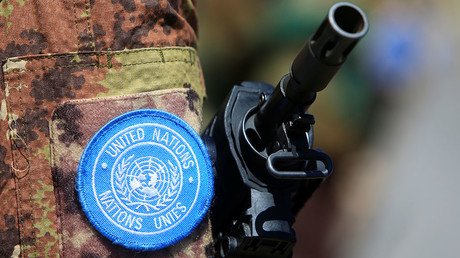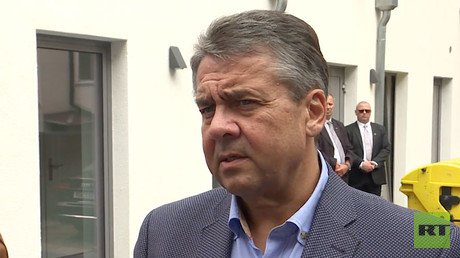Merkel welcomes Putin’s initiative on sending UN peacekeepers to Eastern Ukraine
German Chancellor Angela Merkel has expressed support for President Vladimir Putin's proposal to deploy a UN peacekeeping contingent to the Eastern Ukraine to protect the OSCE monitoring mission there.
Merkel “generally welcomed Putin’s initiative” during a phone conversation with the Russian president, the German government’s press service said in a statement. The two leaders also agreed on the extension of the UN mission’s mandate.
Chancellor Merkel added that the peacekeeping mission should not be limited only to the contact line separating Kiev's forces from the Donbass rebels, but that they should be empowered to accompany members of the Organization for Security and Cooperation in Europe (OSCE) monitoring mission to every region in which they operate.
Putin “reacted positively” to Merkel’s suggestions and said Moscow would consider removing these restrictions from the text of the resolution that Russia submitted to the UN Security Council, a statement from the Kremlin said.
The Kremlin confirmed that the Russian leader “took Merkel’s opinion into consideration” and expressed a readiness to supplement the Russian draft resolution so that it would allow the UN peacekeepers to provide security for the OSCE mission in every region where it could conduct inspections in accordance with the Minsk Agreements.
The two leaders also discussed the process of implementing the Minsk Accords and underlined that any ceasefire violation in Eastern Ukraine by any side are “unacceptable,” the Kremlin statement said further.
Russia proposed a draft resolution to the UN Security Council on sending UN peacekeepers to eastern Ukraine on September 5, after Putin voiced a similar suggestion at a news conference at the three-day BRICS summit in the Chinese city of Xiamen.
Putin said that sending peacekeepers to provide security for the OSCE mission on the contact line in eastern Ukraine would “do good” for the conflict's resolution.
The Russian initiative has already been welcomed by the German Foreign Minister Sigmar Gabriel, who called it the "first right step” on the road to a comprehensive political settlement in Ukraine. Speaking to RT Deutsch last week, Gabriel said Berlin was long in favor of deploying a “robust armed UN mission” to eastern Ukraine.
The minister also called on all the relevant parties to “openly discuss with the Russian Federation the conditions of a UN mission.” He said if the mission would be successful in bringing about a lasting ceasefire, it could become a first step towards the gradual lifting of anti-Russian sanctions.
The representatives of the self-proclaimed People’s Republics of Donetsk and Lugansk have previously expressed their readiness and willingness for dialog on the issue. The proposal was also welcomed by the OSCE Secretariat and its current chair, Austria.
Ukraine, however, has been reluctant to support the initiative. Ukrainian officials said Kiev would never agree to coordinate the details of the mission with the self-proclaimed republics as it would mean their “legalization.” It also emphasized that it does not want to see any Russian, CSTO [Collective Security Treaty Organization] or CIS [Commonwealth of Independent States] troops among the peacekeepers.
The Ukrainian conflict broke out following the ousting of the elected president of Ukraine in a violent coup, followed by the installation of a nationalist-backed government that almost immediately declared war on the regions in the country’s southeast, next to the border with Russia, which refused to recognize the newly-imposed leadership.
Kiev has been conducting a military operation in the south-east of the country since the spring of 2014. The death toll from the conflict has exceeded 10,000 people with around 24,000 injured, according to UN estimates.














